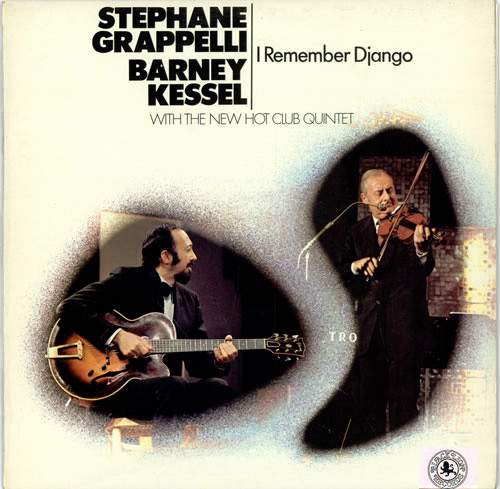
Throughout jazz history musicians have often noted the passing or memory of colleagues with musical tributes, and from time to time on Night Lights we present a program of them. On this year's Memorial Day week edition we'll hear elegies for Johnny Hodges, John Coltrane, Clifford Brown, Django Reinhardt, and other jazz greats from artists such as Elvin Jones, Jaki Byard, Carmen McRae, the Modern Jazz Quartet, Charles Mingus, and Cannonball Adderley, as well as a rare Orson Welles broadcast saluting clarinetist Jimmy Noone.
Even in its origins jazz found an association with such music, in the form of the New Orleans funeral processions accompanied by music, or "jazz funerals," as they came to be known. And we'll begin with a New Orleans jazz farewell introduced by one of the 20th century's most colorful personalities, the filmmaker and actor Orson Welles, who was also a passionate jazz fan, and who in 1944 hosted a CBS radio show called The Orson Welles Almanac that featured a New Orleans jazz band including Kid Ory on trombone, Mutt Carey on trumpet, Zutty Singleton on drums, and Jimmy Noone on clarinet. Just a few weeks into the show, on April 19, 1944, Noone, who had exerted a strong influence on a young Benny Goodman and others, died of a heart attack. When Kid Ory heard the news, he said later that:
I got up right away and began blowing some blues on my horn. I was real sad; Jimmie was my best friend. I found a man to fill in for Jimmie on clarinet. Then I got the band together that afternoon and we rehearsed the tune. On the show that night Mr. Welles explained the situation over the air. I don't mind saying that when we played 'Blues for Jimmie' all the musicians in the band were crying. So was Mr. Welles, and the audience, too.
Welles biographer Frank Brady wrote that when the performance ended, "Orson held his hands up to the audience as a signal not to applaud and then very quietly read the 23rd Psalm. After the show was signed off the air, there was no applause. No one from the audience rose. They sat there stunned." Here's Orson Welles introducing the All-Star New Orleans Jazz Band's tribute to Noone on his radio show in 1944:
https://youtu.be/FH9OGq0eAYE
https://youtu.be/YMYUdZF5hcY
In addition to New Orleans jazz, Welles was also a great admirer of Duke Ellington, even attempting to collaborate with Ellington on Ellington's Jump For Joy musical revue and again in the early 1950s. In this next set we'll hear two tributes from the early 1970s to key longtime members of the Ellington orchestra, both saxophonists-one performed by Charles Mingus in memory of baritone saxophonist Harry Carney, who played with Ellington from the late 1920s up till Ellington's death in 1974-with Carney himself dying not long after. First, "Checkered Hat," a tribute to Johnny Hodges, who had died in 1970, by Hodges' replacement in the Ellington orchestra, alto saxophonist and flutist Norris Turney, its title a nod to Hodges' favored headgear:
One of the most famous jazz elegies was written by John Lewis of the Modern Jazz Quartet, and it almost immediately became a jazz standard after the MJQ first recorded it in 1955. The tune, simply called "Django," honored the great gypsy-jazz guitarist Django Reinhardt, who had passed away in 1953 from a brain hemorrhage at the age of 43, and it laid the foundation for Lewis' reputation as a jazz composer. Writer Eugene Holley Jr. describes "Django" as being composed in a "pyramidal form" and says, "
'Django' begins with an A section whose dirgelike mood recalls Reinhardt's poetic plectral strains. Vibraphonist Milt Jackson takes off with a spirited solo that stretches from the Left Bank to 52nd Street. The B section sizzles with the melodic tension maintained by Lewis' marvelous comping under Jackson. The melodic suspense peaks in the C section, whereupon Lewis takes the solo helm to the conclusion, which restates the main theme.
We'll also hear a 1969 recording featuring Reinhardt's frequent musical partner, violinist Stephane Grapelli, and guitarist Barney Kessel performing Kessel's "I Remember Django."
The "I remember…" lyric motif can be traced to saxophonist Benny Golson's landmark elegy for trumpeter Clifford Brown, "I Remember Clifford," written by Golson in the wake of Brown's death in a 1956 car crash, and subsequently recorded by numerous jazz musicians. In December 1957, just a year and a half after Brown's death, singer Carmen McRae recorded a version with the lyrics that Golson had asked Jon Hendricks to contribute. We'll also hear Nat Adderley and Duke Pearson's lesser-known mid-tempo Brown elegy, recorded in February of the same year.
Jazz elegies can be even more poignant when one or more of the participating musicians had a close professional relationship with the artist being honored. We heard one such example earlier with Stephane Grapelli playing on a piece dedicated to Django Reinhardt, and we'll close with another, recorded in 1969, two years after saxophonist John Coltrane died at the age of 40-a tremendous loss that reverberated throughout the jazz world. Drummer Elvin Jones, who had been a key member of Coltrane's so-called "Classic Quartet" throughout the first half of the 1960s, was leading his own group in 1969, and with bassist Wilbur Little as well as Joe Farrell, heard here on flute, created a tribute to his former bandleader that was used in a three-part suite dedicated to Coltrane on the musical-collective album Head Start:









